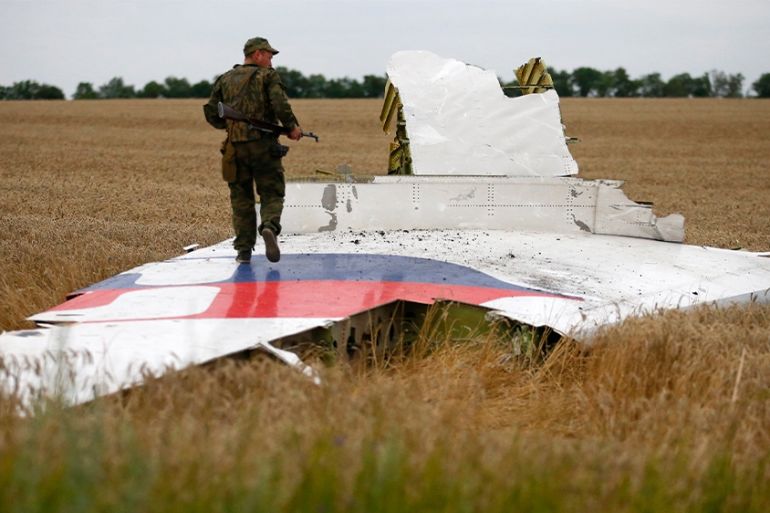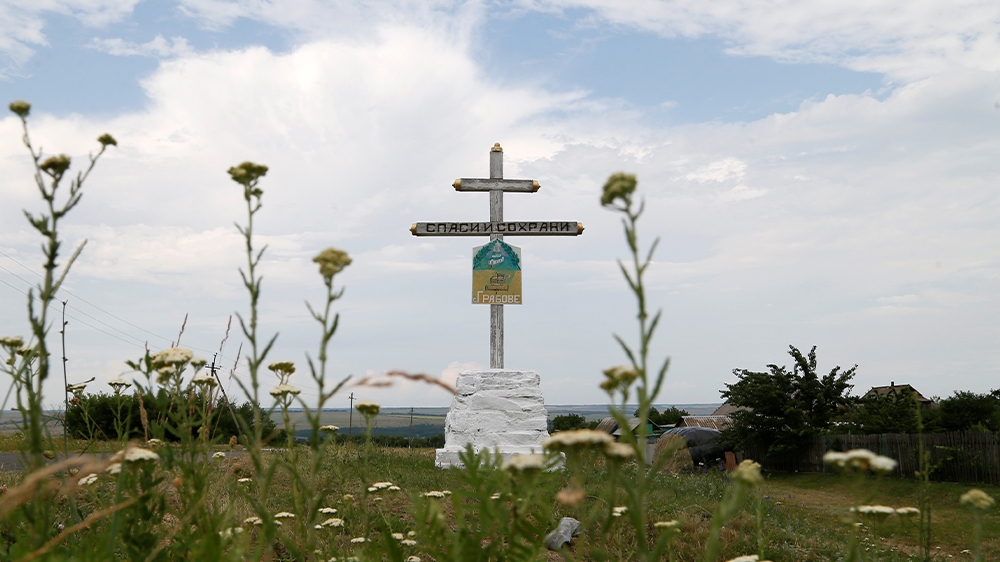Five years after MH17 tragedy a ray of hope for justice
Families, investigators urge Russia to cooperate, five years after plane shot down over rebel-held territory in Ukraine.

Kuala Lumpur, Malaysia – Calls for Russia to cooperate in the investigation into the 2014 downing of flight MH17 over war-torn eastern Ukraine are intensifying as The Netherlands prepares to put four people – all linked to the region’s pro-Russian rebels – on trial for the killing of 298 people.
The five-country Joint Investigation Team charged Russians Igor Girkin, Sergei Dubinskiy and Oleg Pulatov and Ukrainian Leonid Kharchenko last month.
Keep reading
list of 4 itemsMH17: ‘Strong indications’ Putin approved missile supply
ECHR says it can hear case against Russia over MH17 downing
Has justice been served in the MH17 trial?
Girkin, Dubinskiy and Pulatov all have links to Russia’s military and civilian intelligence services. Ukraine has said it will try to locate Kharchenko, who was a senior rebel commander at the time the Malaysian airliner was hit by a missile.
There were suspicions of Russia’s involvement from the beginning, but it was only in September 2016 that investigators said they had “irrefutable evidence” that a mobile Buk surface-to-air missile system had been used to fire on the aircraft, having been moved across the border from the “territory of the Russian Federation”.
In May 2018, investigators said the Buk system was usually stationed with the 53rd Russian military brigade based across the border in Kursk.
Russia has denied any involvement in the tragedy and insists it is a victim of “groundless accusations” designed to undermine its international reputation.
Call for witnesses
The JIT, which is led by the Dutch, has issued a call for witnesses to help them piece together what happened with the Buk, which is usually operated by a crew of four.

It is also looking for people who can help explain photographs and social media chats between the soldiers and help establish the “chain of responsibility” within the Russian Federation.
Brechtje van de Moosdijk, a spokesperson for The Netherlands Public Prosecution Service, told Al Jazeera that there had been a “good response” to the call, but declined to go into detail.
He added that Russia had yet to provide meaningful assistance.
“The Russian authorities have cooperated insufficiently so far,” he said in an email. “Despite repeated requests, they have not answered a number of important investigation questions.”
The Boeing 777 was shot down three hours into its flight from Amsterdam to Kuala Lumpur as it flew over territory that was under the control of pro-Russian separatist rebels who had been fighting against Ukrainian forces for months.
The missile hit close to the left side of the cockpit, and the plane broke up in the air falling to the ground across an area covering 60 square kilometres.
Bodies, some still strapped into their seats, were spread across fields of sunflowers amid burning debris, luggage, soft toys and other belongings. As the conflict continued, and in the heat of summer, officials tried to negotiate access to the site with the Ukrainian government and the rebels.
Lives cut short
While most of those on board were from the Netherlands, there were dozens of Malaysians and Australians as well as citizens of countries from Canada to New Zealand. They included some of the world’s leading HIV experts who were travelling to an international conference in Australia, as well as 80 children.
Nur Shazana Mohd Salleh, 31, was one of the 15 members of the crew, and had been working as a flight attendant for Malaysia Airlines for 10 years.
Her father, Mohd Salleh Shamsuddin recalls how he had tried to convince her to become a lawyer, but she had put aside her studies to pursue her dream of flying.
“She didn’t want to get attached to anyone,” he said. “She just wanted to fly. She loved what she did and we were very happy for her.”
The horror of the attack provoked worldwide condemnation and the UN Security Council passed a resolution four days later backing an international investigation.
In a statement to mark the fifth anniversary of the tragedy, family members urged Russia to comply with that resolution.
“The truth about what happened to MH17 exists and it matters,” the statement said. “A trial will allow all the evidence to be properly tested and the truth to be firmly established. A trial also sends the important message that you cannot kill innocent people and expect no consequences.”
“We want those directly responsible for committing this crime, along with the chain of command above them, to be named and for history to know who they are and what they have done.”
Both Ukraine and Russia, which backed the rebels, have Buk missile systems.
Creating confusion
Investigators pieced together evidence from witnesses, photographs, video and audio recordings to show that the warhead had been fired from separatist territory, from a Buk that had been brought from Russia – crossing the border with four missiles and returning with only three.
But after the JIT announced the criminal charges in June, Malaysia’s Prime Minister Mahathir Mohamad told the local media that the tragedy had been politicised, and cast doubts on Russia’s involvement.
“Even before they examined, they already said Russia,” Mahathir told Malaysiakini, an online newspaper. “Now they say they have proof so it is very difficult for us to accept that.”
Malaysia is a member of the JIT and senior civil servant Mohamad Hanafiah Zakaria was seated at the table as the charges were announced. Relatives of Malaysian victims said the prime minister’s comments had only increased their anguish.
Mohd Salleh, who will be attending a memorial organised by Australia and the Netherlands in Kuala Lumpur on Wednesday evening, said he and other families of the victims were left angry and confused by the comments and were demanding a briefing with officials.
In a statement on Wednesday, Malaysia’s Ministry of Transport said the government would continue to work with the JIT and was committed to finding “those responsible for this heinous crime, and (to) secure justice for the victims. We will remain resolute in our pursuit and leave no stone unturned until justice is served.”
Both The Netherlands and Australia have said they hold Russia responsible for the attack on MH17.
The two countries are “engaging in talks with the Russian Federation,” Australia’s Foreign Minister Marise Payne said on Wednesday, noting that the JIT decision to charge the four men was a “significant step towards justice and accountability”.
The suspects will go on trial on March 9 next year in a high-security building near Schiphol Airport. Neither Russia nor Ukraine allow extradition of their citizens, so none of the men are likely to be standing in the dock, but for the families of those who died there is at last some opportunity for justice.
“At least now there is light at the end of the tunnel,” said Mohd Salleh. “There is hope.”